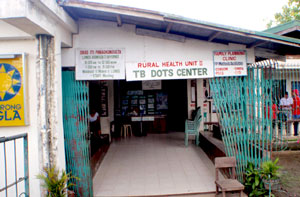Up to 1.5 million people died from Tuberculosis (TB) in 2010–mostly in developing countries. In the same year, there were an estimated 8.8 million new TB cases with more than half of these cases occurring in the Asia Pacific region. Yet the disease is both preventable and treatable.
World TB Day, on 24 March, acknowledges the devastating impact this disease continues to have on people around the world.
TB is slowly declining worldwide, but there is still much to be done. There are an increasing number of cases of people living with HIV contracting TB, as well as the emergence of drug-resistant strains of the disease. Through AusAID, Australia is helping developing countries to prevent and control TB.
Improving TB treatment
What is TB?
TB is a serious infectious disease that most commonly affects the lungs. Symptoms of active TB include persistent coughing, night sweats, weight loss and chest pains. TB is treatable with a six month course of antibiotics.
Without treatment, mortality rates are high. In 2011, the WHO reported that almost 10 million children were orphaned as a result of TB in 2009.
TB is a major contributor to poverty as it mostly affects adults during their working years, which impacts on families and the productivity of communities. People with TB often suffer from discrimination and stigma, rejection and social isolation.
TB is also the leading killer of people living with HIV. Because of their weakened immune system, people living with HIV are many times more likely to suffer from TB once they are infected with the bacteria.
Australia focuses its efforts on comprehensive, effective and sustained TB services. AusAID provides country level support, assistance through international organisations and non-government organisations, and engages with research bodies to help developing countries address TB prevention and control.
AusAID provides funding to the World Health Organization (WHO) for technical support to developing countries to assist in TB prevention and control, including supporting the WHO to take an active role in tackling drug resistant TB.
In Papua New Guinea, Australia is providing $8 million over four years (2011-12 to 2014-15) to support health authorities in Western Province to improve treatment for TB patients. Australia is also supporting World Vision's 'Stop TB in Western Province' project which will train health workers, promote community awareness and support TB treatment across the province.
In Indonesia, we have encouraged investment in TB prevention programs through a debt-to-health swap. Australia has agreed to cancel $75 million of Indonesia's debt in return for Indonesia investing $37.5 million in 2010-16 to expand TB treatment and prevention activities.
In Burma, AusAID helped to successfully treat 18,000 new TB cases and register a further 60,000 for treatment in the first half of 2010. During this period, we also helped to test more than 4000 TB patients for HIV, due to their increased vulnerability to the disease.
Australia also contributes to the fight against TB through the Global Fund to Fight AIDS, Tuberculosis and Malaria. Since 2002, the Global Fund has detected and treated 8.6 million new cases of TB. Though the Global Fund, Australia supports TB programs in countries such as Solomon Islands, Cambodia, East Timor, Laos, Papua New Guinea and Indonesia.
Given the nature of TB treatment, which requires strong efficient referral pathways to ensure patients are taking their treatment, strong health systems are fundamental to the fight against TB. In countries like Nepal, Cambodia, Vanuatu and the Solomon Islands, AusAID is helping improve community health services which work to strengthen prevention and treatment efforts.
AusAID also works in international forums to promote effective, practical approaches to TB prevention and treatment.
We know there is a big task ahead but TB is preventable and it is treatable. Through our aid program we can, and are, saving lives.
More information
AusAID strengthens TB detection and treatment in Papua New Guinea
WHO Stop TB Strategy (external website)
WHO Global tuberculosis control 2011 report (external website)

